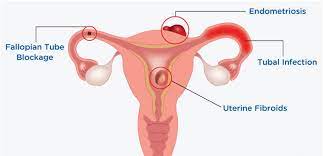Understanding Female Fertility: Factors, Diagnosis, and Treatment

Female fertility refers to a woman’s ability to conceive and carry a pregnancy to term. It is a complex and dynamic process that is influenced by various factors, including hormonal balance, reproductive anatomy, and overall health. Understanding female fertility is crucial for individuals and couples who are planning to start a family or are experiencing difficulties in conceiving.
It is influenced by a number of factors, including age, lifestyle, and underlying health conditions.
- Age: Fertility peaks in a woman’s early 20s and declines gradually after that. By age 35, fertility starts to decline more rapidly. After age 40, it becomes increasingly difficult for a woman to get pregnant naturally.
- Lifestyle: Factors such as being overweight or underweight, smoking, and excessive alcohol consumption can all impact fertility.
- Underlying health conditions: Some health conditions, such as polycystic ovary syndrome (PCOS), endometriosis, and thyroid problems, can also affect fertility.
In this discussion, we will explore female fertility in detail, covering topics such as the menstrual cycle, ovulation, factors affecting fertility, age-related changes, and available fertility treatments.
Menstrual Cycle
The menstrual cycle is a monthly hormonal cycle that prepares a woman’s body for pregnancy. On average, it lasts about 28 days, although it can vary from person to person. The cycle is divided into different phases, including menstruation, the follicular phase, ovulation, and the luteal phase.
Ovulation
Ovulation is a crucial event in female fertility. It is the release of a mature egg from the ovaries, which then travels down the fallopian tubes, where it can be fertilized by sperm. Ovulation typically occurs around the middle of the menstrual cycle, but it can also vary. Several factors can affect ovulation, such as hormonal imbalances, stress, and certain medical conditions.
Fertility Factors
Various factors can impact a woman’s fertility. Some key factors include:
a. Age: A woman’s age is a significant factor in fertility. Women are born with a finite number of eggs, and their quantity and quality decline as they age. The chances of getting pregnant decrease significantly after the age of 35, with a more pronounced decline after 40.
b. Hormonal Balance: Hormones play a crucial role in regulating the menstrual cycle and fertility. Any disruption in hormone levels, such as polycystic ovary syndrome (PCOS) or thyroid disorders, can affect fertility.
c. Reproductive Anatomy: Structural abnormalities in the reproductive organs, such as blocked fallopian tubes or uterine abnormalities, can impact fertility by hindering the fertilization of the egg or implantation of the embryo.
d. Lifestyle Factors: Various lifestyle factors can influence fertility, including body weight (both underweight and overweight), smoking, excessive alcohol consumption, drug use, and certain medications. Additionally, exposure to environmental toxins and chemicals may also affect fertility.
e. Medical Conditions: Certain medical conditions can affect fertility, such as endometriosis, polycystic ovary syndrome (PCOS), pelvic inflammatory disease (PID), and reproductive cancers.
Age-Related Changes
As a woman ages, her fertility gradually declines. This decline is primarily due to a decrease in the number and quality of eggs. Additionally, there is an increased risk of pregnancy complications and chromosomal abnormalities in offspring as a woman gets older.
Fertility Treatments
For individuals or couples facing fertility challenges, various fertility treatments are available. These include:
a. Assisted Reproductive Technology (ART): ART encompasses procedures such as in vitro fertilization (IVF), intracytoplasmic sperm injection (ICSI), and embryo transfer. These techniques involve the manipulation of eggs and sperm in a laboratory setting to facilitate fertilization and implantation.
b. Fertility Medications: Medications such as Clomiphene citrate or gonadotropins can be used to stimulate ovulation in women who have difficulty ovulating regularly.
c. Surgical Interventions: In some cases, surgical procedures may be required to correct structural abnormalities or remove blockages in the reproductive organs.
d. Donor Options: If a woman is unable to produce viable eggs, donor eggs can be used for fertilization. Similarly, donor sperm or embryos can be used to achieve pregnancy in cases where the male partner has fertility issues.
There are a number of things that women can do to promote fertility, including:
- Maintaining a healthy weight: Being overweight or underweight can interfere with ovulation, so it’s important to maintain a healthy weight.
- Eating a healthy diet: Eating a healthy diet that is rich in fruits, vegetables, and whole grains can help to improve overall health and fertility.
- Getting regular exercise: Exercise can help to improve overall health and fertility. However, it’s important to avoid strenuous exercise in the days leading up to ovulation, as this can interfere with the release of an egg.
- Avoiding smoking and excessive alcohol consumption: Smoking and excessive alcohol consumption can both impact fertility.
- Managing stress: Stress can have a negative impact on fertility. Finding ways to manage stress, such as yoga, meditation, or spending time in nature, can help to improve fertility.
If a woman is concerned about her fertility, she should talk to her doctor. There are a number of tests that can be done to assess fertility, and there are also a number of treatments available if there are underlying health conditions that are affecting fertility.
Delivering your fertility medications on schedule, every time
HubPharm makes it as simple as possible to follow the treatment your doctor recommends. We offer same-day delivery and medication management tools like reminders and auto refills in our app. Our team of patient care pharmacists is also available to walk you through dosage instructions and answer your questions. Reach out via phone or WhatsApp +2347065335797 or in-app messaging to get started.
It’s important to note that female fertility is a complex and individualized topic, and factors influencing fertility can vary greatly from person to person. If you have concerns about your fertility, it is advisable to consult with a healthcare professional or a fertility specialist who can provide personalized guidance and recommendations.
References
https://www.mayoclinic.org/healthy-lifestyle/getting-pregnant/in-depth/female-fertility/art-20045887
https://my.clevelandclinic.org/health/diseases/17774-female-infertility
https://www.healthline.com/nutrition/16-fertility-tips-to-get-pregnant